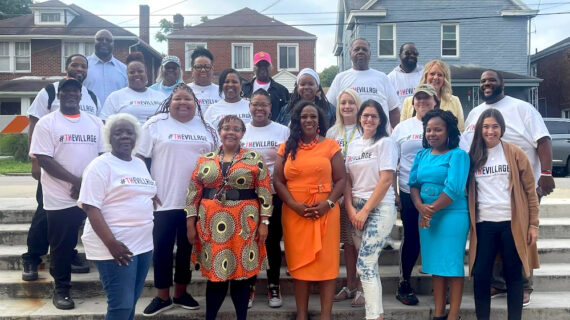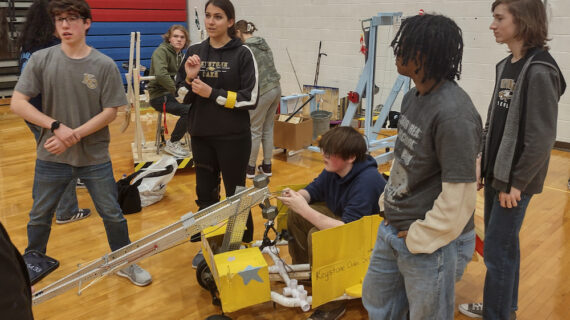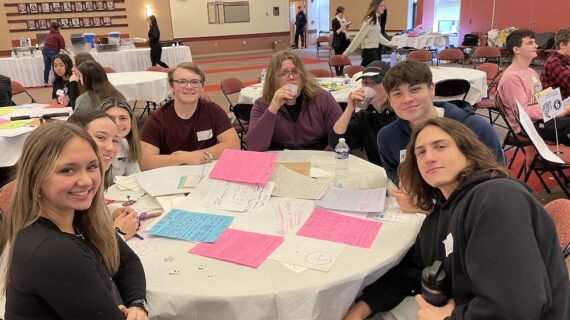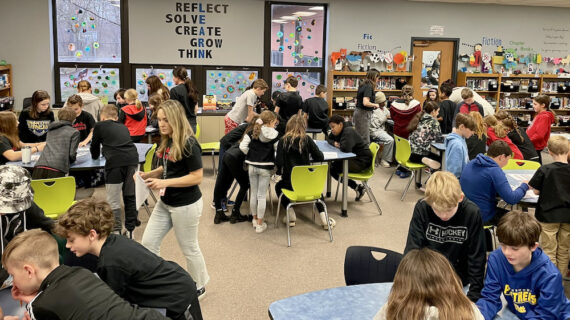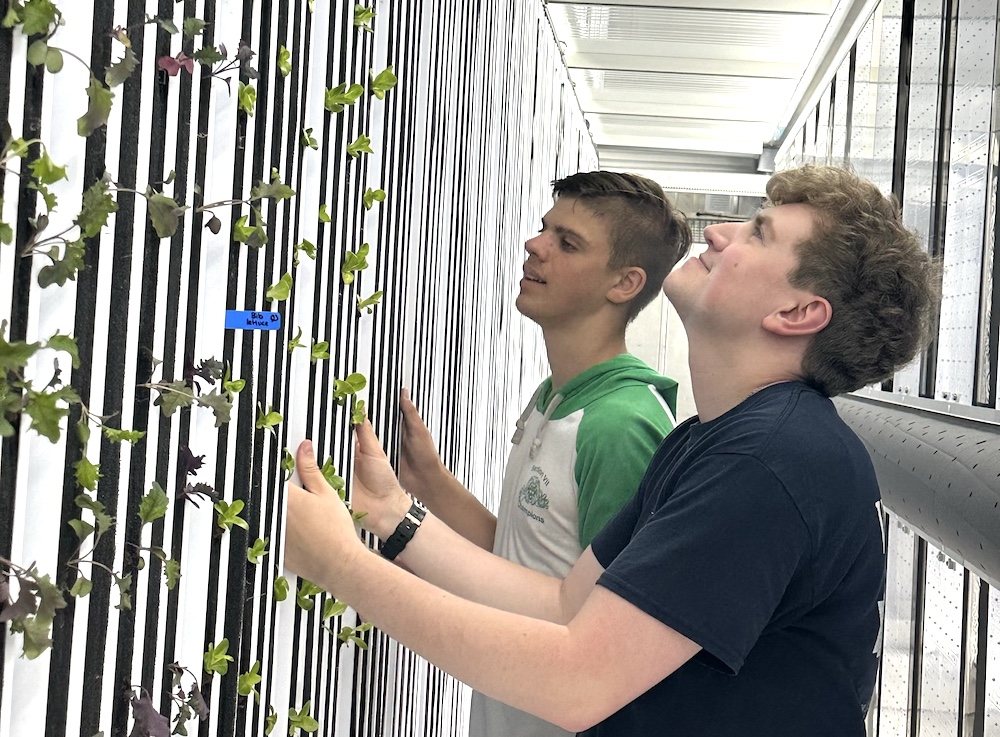
Growing produce — and partnerships — in the South Fayette Township School District
This story is one in a series created in collaboration with the AASA Learning 2025 Alliance to celebrate the work of groundbreaking school districts in the Pittsburgh region. Kidsburgh will share these stories throughout 2024.
To explore the campus of the South Fayette Township School District is, in many ways, to explore the future of learning.
A shipping container behind the high school looks deceptively like a storage unit — until its giant, flower-shaped solar array turns to track the sun. Inside, the container holds the equivalent of two-and-a-half acres of farmland, capable of growing up to six tons of produce every single year. And the whole system — from the collection of solar power to the planting and harvesting of food to the analysis of critical data — is managed by South Fayette’s students and partners.
“Our life skills students are growing produce, and with our partners at Parkway West [a career and technology center near South Fayette’s campus], they package and sell it for use in the culinary arts program’s restaurant,” explains Matthew Callison, the district’s director of innovation and strategic partnerships.
Meanwhile, thanks to a partnership with youcubed — a mathematics-focused nonprofit run by Stanford University — “our teachers are helping students collect data from the farm and pilot data science projects from kindergarten through 12th grade.”
These partnerships, officials say, are key to offering innovative, diverse, high-quality learning opportunities for every student. In fact, part of Callison’s job is to take teachers to the tech companies, laboratories, and cutting-edge industries that will someday hire South Fayette’s students. Along the way, teachers gain firsthand experience with the knowledge and skills that employers value most — and together, they dream up new and creative ways to equip their learners for success.
“We talk about being future-focused, student-centered, and innovation-driven,” says Michelle Miller, the district’s superintendent. “But if we’re really going to be innovative, we need to look beyond the things we typically see in K-12 schools. Sometimes, that means turning to higher ed. Sometimes, it means partnering with businesses. But more than anything, it means looking outside and gaining a new perspective.”
This willingness to look beyond its walls led South Fayette to join the Western Pennsylvania Learning 2025 Alliance, a regional cohort of school districts working together — with support from The Grable Foundation — to create the kind of student-centered, equity-focused, future-driven schools that Miller describes. Led by local superintendents and AASA, The School Superintendents Association, the Alliance convenes to help districts like South Fayette do what they do best: prepare every learner for tomorrow.
The cohort, says assistant superintendent Kristin Deichler, “has really brought us together as a region. Before the Alliance, there was lots of mutual respect, but not a lot of exchange. It’s so much more collaborative now. We’re doing projects with other school districts like World of Work career exploration, and with people and places that you might not expect. And it’s all leading to really exciting opportunities for students.”

Indeed, leave South Fayette’s solar-powered farm and you might encounter the district’s cybersecurity pathway. Developed in partnership with the national nonprofit Digital Promise, the pathway helps students earn industry credentials and real-world experience in a fast-growing, high-need field.
Walk a little farther and you’ll find the Fly Like a Girl drone academy, a partnership among South Fayette and other school districts participating in the Alliance. The multi-week academy immerses high school girls in hands-on STEM instruction, pairing them with drone industry professionals who help interested students earn their Unmanned Aerial Vehicle license from the Federal Aviation Administration. You might even see the “CAVERN”, an extended-reality space for learners, created in partnership with Carnegie Mellon University. It’s the first such space to operate in a K-12 school district.
Keep walking and you’ll see decidedly lower-tech partnerships, too. Across the district’s campus, students play Terrible Workers, a card game created with Carnegie Mellon University.
“Basically, we developed a game that reinforces the skills outlined in South Fayette’s Portrait of a Lion Learner — things like communication and problem solving,” says Callison. “What we’ve found is that the game motivates students to think about soft skills — and to keep developing them — in a way that other approaches don’t.”
And, adds Callison, “It’s really fun to play.”
To Miller, that’s the whole point. Innovation, she says, doesn’t always mean a drone academy or a farm inside a shipping container. “It can be those things, but there’s also innovation in the little things that make learning more joyful — things like the card game. There’s innovation in all the little ways we show our students and our staff how much they matter.”
Case in point: Every year, the district distributes themed medallions to staff members who embody South Fayette’s core values. Those who receive a medallion can then give one to somebody else, creating a pay-it-forward effect. At the end of the school year, South Fayette hosts an awards gala for staff who’ve received medallions. Miller and Deichler even write personal notes to recipients’ spouses and families, thanking them for their influence and letting them know how proud their loved ones have made the district.
It’s one more way South Fayette builds partnerships in service of students.
“Sometimes,” says Miller, “partnerships happen organically. Other times, you have to go out in the world and find good partners. And then sometimes, your partners are already here — they’re the people working day in and day out in classrooms, on school buses, in our cafeterias, in the district office, at home.”
All of those people are worth celebrating, she says. “Because here in South Fayette, we work better when we work together.”
Want to download this story? Click here for a PDF.
